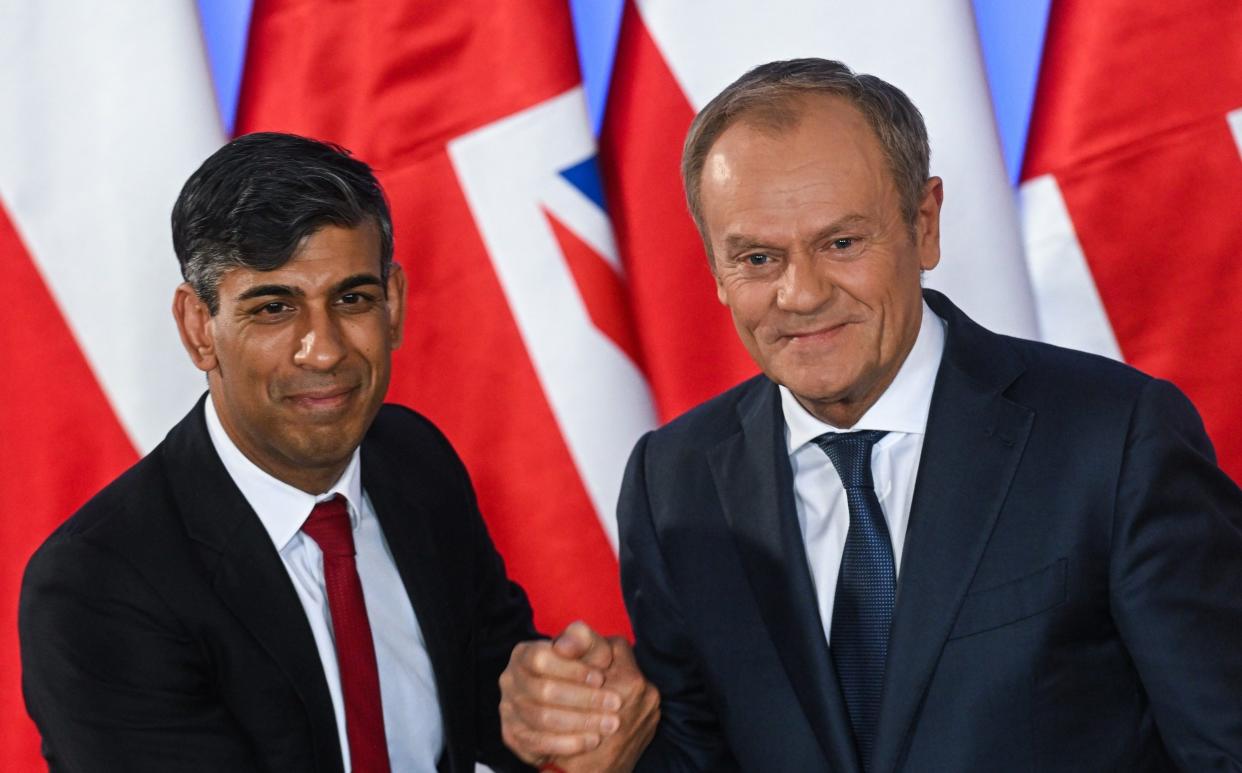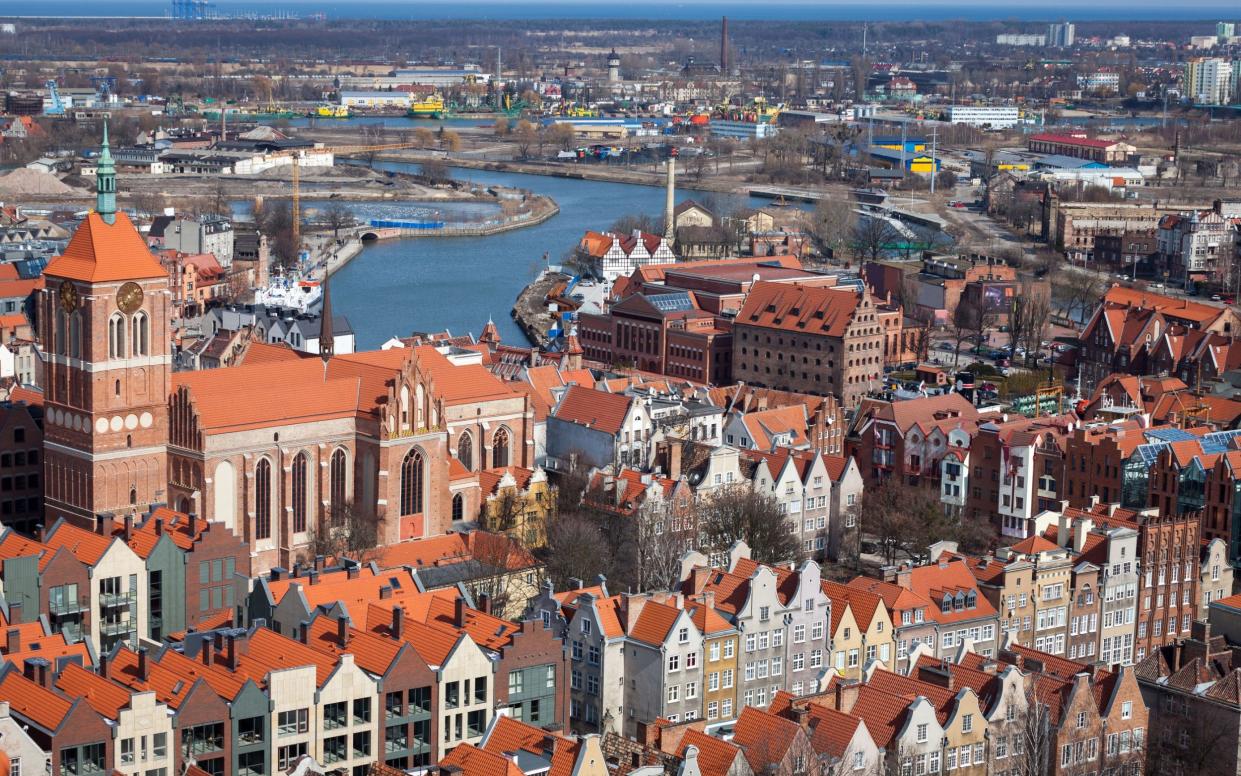Poland’s prime minister got one thing wrong about Britain

“Il sorpasso” (the overtaking), Donald Tusk, the prime minister of Poland, seemed to proclaim in promising that as measured by GDP per capita, Poles will be richer than their British counterparts by 2030.
This was the triumphant term used by the Italian press in 1987 when thanks largely to exchange rate movements, Italian GDP briefly surpassed the UK.
It didn’t last long. Using US dollars as the measure, the Italian economy is today 34pc smaller than its UK counterpart. The comparison looks slightly better in per capita terms, but at around 20pc below Britain, not much.
So what to make of Tusk’s claim, made last week to coincide with the 20th anniversary of Poland’s accession to the European Union, and intended to make the point that Poles are much better off inside the EU than Britain is outside it?
The claim is not new. Similar projections were used last year by the Labour leader, Sir Keir Starmer, to highlight supposed Tory failure.
“The British people are falling behind while our European neighbours get richer, in the east as well as in countries like France and Germany,” Starmer said. “I’m not comfortable with that. Not comfortable with a trajectory that will soon see Britain overtaken by Poland.”
Can Poland really be as close as claimed to catching Britain up? And could it actually be true, as Tusk implied, that things would have been so much better for the UK had it remained in the EU?
Tusk’s claims, like those of Starmer, are based on long term World Bank forecasts for economic growth. These do indeed seem to imply that Poland will overtake the UK in per capita terms round about the turn of the decade, with continued stagnation in the UK progressively outstripped by strong growth in Poland.
Yet all such comparisons depend vitally not just on the inexact science of economic forecasting, but on what parameters are used, and particularly what happens to exchange rates.
For instance, in US dollar terms, national income per head in Poland is still only $23,000 (£18,000), or less than half that of the UK. It would take economic growth of well in excess of 3pc per annum for Poland to catch up with Britain on that measure. According to separate International Monetary Fund projections, it will not.
In current dollar terms, Polish GDP per head rises to only $29,300 by 2029, according to the IMF – still less than half that projected for the UK.
If we instead take purchasing power parity as the measure, which attempts to adjust for the fact that the cost of living is substantially lower in Poland than Britain, then Poland is already richer than the UK – $49,000 per capita against $47,000. That gap is forecast by the IMF to widen further over the next five years to $63,500 against the UK’s $50,000.
Yet one thing that Tusk has definitely got wrong is attributing the difference to membership of the European Union. This has of course been extraordinarily advantageous to Poland, so Tusk is bound to be generous in handing out the credit.
Nor is it just because Poland has had the benefit of very sizeable net transfers from the rest of the EU to help the country modernise and catch up.
As part of Europe’s single market, it has also enjoyed the advantage of a relatively low-cost labour force, prompting many European companies to locate operations there. It’s on the whole much cheaper to manufacture in Poland than it is in Germany and France. The workforce tends to be younger and more compliant.
What’s more, Poles have been prime beneficiaries of the single market’s core free movement principles. For this, Mr Tusk owes the UK a huge debt of gratitude. Unlike much of the rest of Europe, including France and Germany, Britain allowed Poles the right to live and work in the UK with immediate effect on accession in May 2004.
This could theoretically have been quite bad for the Polish economy. Hundreds of thousands of Poland’s prime working age population leapt at the opportunity to live and work in Britain, Ireland and Sweden, the only EU countries not to impose restrictions.
Yet in practice, the constant toing and froing proved a powerful driver of economic growth in Poland, which gained valuable expertise from returning migrants and enjoyed a steady stream of remittances. The stories were possibly apocryphal, but whole Polish villages were said to subsist on the largesse of British tax credits and welfare payments.

Still, we must not begrudge Poland its success. The purpose of EU enlargement was to give Eastern Europe a future after the degradation of post-war communism, and in Poland it has succeeded big time.
Starting from nothing can often be an advantage, and Poland has made full use of its clean slate. Contrast this with the huge legacy welfare costs that Europe’s larger, advanced economies have to grapple with.
In any case, Poland’s newcomer status meant that it was only marginally connected to the international banking system, enabling it to sail through both the financial crisis and the later eurozone debt crisis largely unscathed.
Poland also seems to have handled the pandemic rather better than Britain; it cost both the economy and the public purse far less.
Yet Poland’s strengths may yet prove to be its future weaknesses. High dependence on agriculture, manufacturing and coal does not obviously equip Poland well for the faster growing, higher value added, and greener service industries of the future.
And although Poland’s success plainly has much to do with membership of the EU, Tusk’s second point – that Britain’s economic torpor is explained by its decision to quit the EU – isn’t so easily argued.
It may be true, though it is impossible to prove, that the UK economy would have performed more strongly had it stayed in the EU. Personally, I believe it would have done.
But if we look at the EU’s three biggest remaining economies – Germany, France and Italy – they have all performed equally badly if not worse than the UK since the vote for Brexit.
IMF forecasts, moreover, suggest that Britain will continue to outperform from next year onwards to the turn of the decade, though the differences are admittedly marginal.
In other words, if Poland is poised to overtake the UK in income per head, it will also be overtaking France, Germany and Italy. This would strongly suggest that whatever future economic success Poland enjoys, the EU will no longer be the primary explanation. After more than three decades of growing fat on the pig’s belly, Poland’s years of easy growth may be drawing to a close.
Meanwhile, the UK has overtaken China to become the world’s number-two destination by value after the US for greenfield foreign direct investment, and its service industries’ exports are booming as never before. These realities do not chime with the idea of a country in terminal decline.
In any case, I’ll believe Poland’s “il sorpasso” when I see it.


